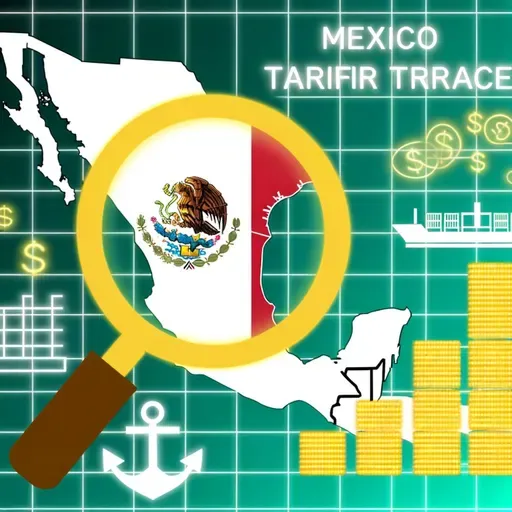
12 October 2025
Trump Escalates Mexico Tariffs: Automotive and Agricultural Sectors Brace for $30 Billion Impact in 2025 Trade War
Mexico Tariff News and Tracker
About
Listeners, here’s the latest on tariffs between the United States and Mexico as global trade tensions ramp up in 2025. President Trump continues to wield tariffs as his primary economic and diplomatic tool. Since February, the administration has imposed around 25 percent tariffs on most imports from Mexico, with some exceptions for energy products. These rates remain active today according to IUEMAG, directly affecting everything from steel and aluminum to agricultural goods.
The uncertainty doesn’t stop there. The Commerce Department recently withdrew from a 2019 agreement suspending antidumping duties on Mexican tomatoes, reimposing steep tariffs of 17 percent on tomato imports. Members of Congress from Texas have made public appeals for a renewed bilateral deal, arguing that the move disproportionately hurts local industries. The tomato dispute is only one example of broader friction, as sectors like automotive and electronics are feeling the squeeze.
For automakers, the consequences are severe. Moody’s Ratings announced a warning this week that global carmakers could collectively lose as much as $30 billion in 2025 operating profits due to Trump’s tariff campaign, with negotiations on the US-Mexico-Canada Agreement still unresolved. Margins are expected to shrink by at least one percentage point as both manufacturers and consumers absorb higher costs. Companies are reacting by scaling back vehicle amenities and raising prices, meaning listeners in the market for a new car can expect to pay more for less.
The Trump administration’s “America First” trade policy, formalized in a January 20 memorandum, set the stage for this year’s aggressive action. Despite periodic pauses earlier in the year, the tariffs against Mexico have mostly persisted. On July 12, President Trump sent official notice that a new wave of tariffs at a 30 percent rate would take effect on August 1, targeting goods that don’t meet the standards of the US-Mexico-Canada Agreement. Negotiations for carveouts and exceptions—especially in agriculture and autos—remain haphazard and unpredictable.
On the Mexican side, planned retaliatory tariffs were never announced, reflecting both economic pressure and a strategic wait-and-see approach. The tomato industry, however, faces immediate challenges, with exported products now less competitive against U.S.-grown produce. Mexico is also dealing with fallout from U.S. restrictions on steel and aluminum imports, fighting to maintain its access to the American market, and managing concerns about rising consumer prices.
For listeners tracking the tariff headlines, the news is constant. The cost of imported goods is up, companies are maneuvering to protect their profits, and cross-border relations are tense. President Trump shows no signs of backing down, warning that further tariff hikes are possible if negotiations stall. The next checkpoint is November 1, when a new 25 percent U.S. auto tariff is set to hit, adding another layer of complexity for Mexican manufacturers and exporters.
Thanks for tuning in to Mexico Tariff News and Tracker. Don’t forget to subscribe for the latest developments. This has been a quiet please production, for more check out quiet please dot ai.
For more check out https://www.quietperiodplease.com/
Avoid ths tariff fee's and check out these deals https://amzn.to/4iaM94Q
This content was created in partnership and with the help of Artificial Intelligence AI
The uncertainty doesn’t stop there. The Commerce Department recently withdrew from a 2019 agreement suspending antidumping duties on Mexican tomatoes, reimposing steep tariffs of 17 percent on tomato imports. Members of Congress from Texas have made public appeals for a renewed bilateral deal, arguing that the move disproportionately hurts local industries. The tomato dispute is only one example of broader friction, as sectors like automotive and electronics are feeling the squeeze.
For automakers, the consequences are severe. Moody’s Ratings announced a warning this week that global carmakers could collectively lose as much as $30 billion in 2025 operating profits due to Trump’s tariff campaign, with negotiations on the US-Mexico-Canada Agreement still unresolved. Margins are expected to shrink by at least one percentage point as both manufacturers and consumers absorb higher costs. Companies are reacting by scaling back vehicle amenities and raising prices, meaning listeners in the market for a new car can expect to pay more for less.
The Trump administration’s “America First” trade policy, formalized in a January 20 memorandum, set the stage for this year’s aggressive action. Despite periodic pauses earlier in the year, the tariffs against Mexico have mostly persisted. On July 12, President Trump sent official notice that a new wave of tariffs at a 30 percent rate would take effect on August 1, targeting goods that don’t meet the standards of the US-Mexico-Canada Agreement. Negotiations for carveouts and exceptions—especially in agriculture and autos—remain haphazard and unpredictable.
On the Mexican side, planned retaliatory tariffs were never announced, reflecting both economic pressure and a strategic wait-and-see approach. The tomato industry, however, faces immediate challenges, with exported products now less competitive against U.S.-grown produce. Mexico is also dealing with fallout from U.S. restrictions on steel and aluminum imports, fighting to maintain its access to the American market, and managing concerns about rising consumer prices.
For listeners tracking the tariff headlines, the news is constant. The cost of imported goods is up, companies are maneuvering to protect their profits, and cross-border relations are tense. President Trump shows no signs of backing down, warning that further tariff hikes are possible if negotiations stall. The next checkpoint is November 1, when a new 25 percent U.S. auto tariff is set to hit, adding another layer of complexity for Mexican manufacturers and exporters.
Thanks for tuning in to Mexico Tariff News and Tracker. Don’t forget to subscribe for the latest developments. This has been a quiet please production, for more check out quiet please dot ai.
For more check out https://www.quietperiodplease.com/
Avoid ths tariff fee's and check out these deals https://amzn.to/4iaM94Q
This content was created in partnership and with the help of Artificial Intelligence AI